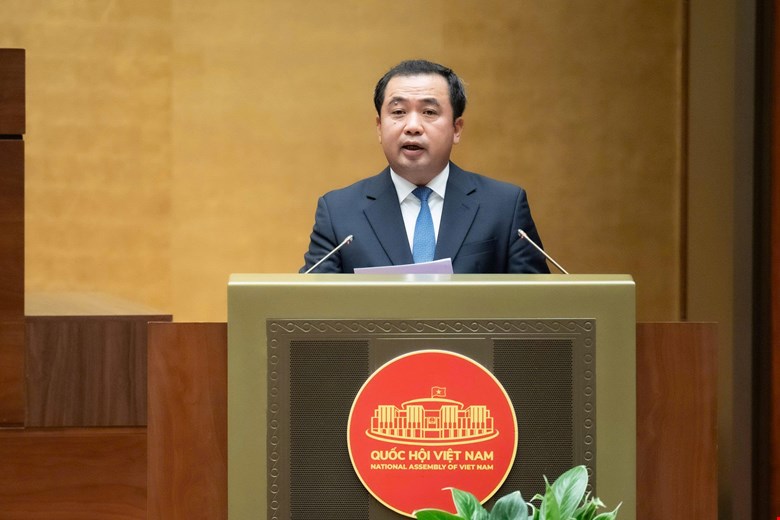On November 18, the National Assembly listened to the Minister of Agriculture and Environment (MONRE) present the Draft Resolution of the National Assembly stipulating a number of mechanisms and policies to remove difficulties and obstacles in organizing the implementation of the Land Law.
Minister of Natural Resources and Environment Tran Duc Thang said that the draft consists of 3 chapters and 13 articles focusing on solving bottlenecks and problems arising from practice, improving the efficiency of land management and use.
Regarding compensation for land when the State reclaims it, the drafting agency proposed to apply the price list and adjustment coefficient as a basis.
The current law stipulates compensation according to specific land prices decided by the People's Committee at the competent level at the time of approving the compensation and resettlement plan.
According to the draft resolution, the land price list will be built according to land types, locations, and areas. The Provincial People's Council decides on the land price list, announces and applies it from January 1, 2026. The price list will be amended and supplemented when necessary.
The draft resolution also adds 3 cases of State land recovery for socio-economic development for national and public interests.
The first case is projects in free trade zones, projects in international financial centers.
In fact, these projects have a large scale of land use, promoting local socio-economic development, contributing large revenues to the budget, creating more jobs but there are no regulations on land acquisition. This causes difficulties in land access and project implementation.

Secondly, in case the investor can negotiate over 75% of the area or with 75% of the people with land, the Provincial People's Council will reclaim the remaining part to hand over to them.
And finally, the State reclaims to create a land fund to pay according to the BT contract, lease land to continue production and business.
The report also stipulates the conditions for land recovery for national defense, security, and socio-economic development for national and public interests.
Reviewing this content, Chairman of the Economic and Financial Committee Phan Van Mai said that the majority of opinions raised here are a policy proposal to remove "bottlenecks" in the implementation of socio-economic development projects through agreements to receive land use rights.
This mechanism creates favorable conditions for investors when they have negotiated most of the land area but have encountered difficulties in completing site clearance to implement the project on schedule.
It is recommended to clarify the basis for proposing the area ratio and the number of people in agreement; the mechanism for handling the remaining area of the project when the investor has agreed on over 75% of the area and received the consensus of over 75% of the number of land users within the project implementation scope.
The handling of the remaining land area and the remaining land owners must ensure human rights and civil rights according to the provisions of the Constitution; limit the emergence of complaints and lawsuits.
It is recommended that there should be harmonious regulations on benefits when calculating compensation, avoiding the possibility of complaints and lawsuits when applying the land price list and the adjustment coefficient to calculate compensation for the remaining cases because the land price in the price list is often lower than the agreed average price.
Some opinions say that adding cases of land recovery should be carefully considered, ensuring the provisions of the Constitution, avoiding affecting people's rights, and not applying it widely...











